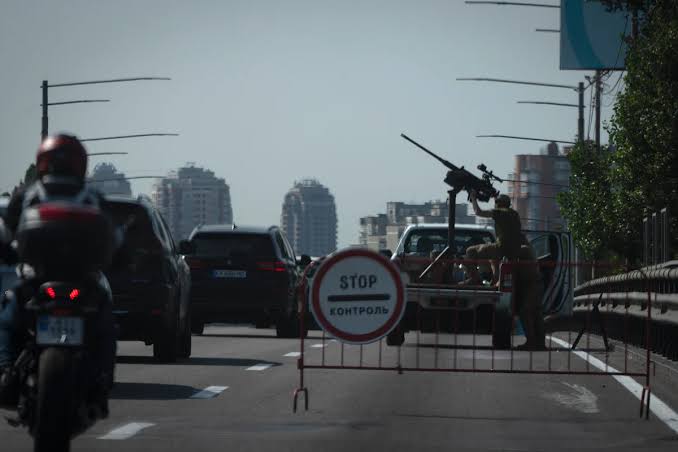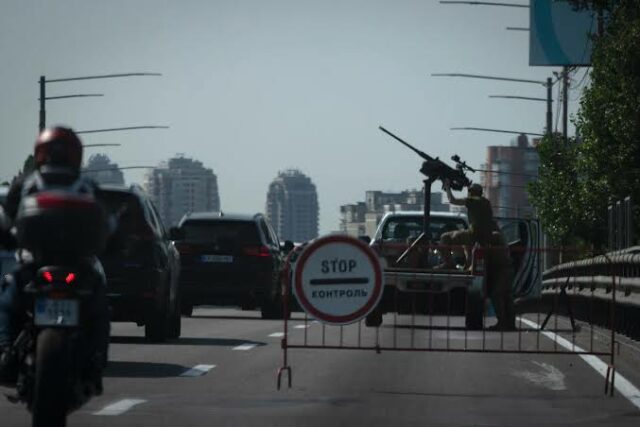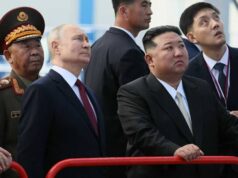Countering Kursk Offensive, Russia sends deadly barrage of missiles over half of Ukraine

Russia battered much of Ukraine on Monday, firing scores of missiles and drones that covered half of Ukraine, as a counter response to the failed Kursk offensive of Zelenskyy.
The barrage of over 100 missiles and a similar number of drones began around midnight and continued through daybreak in what appeared to be Russia’s biggest counter onslaught in weeks.
Ukraine’s air force said swarms of Russian drones fired at eastern, northern, southern, and central regions were followed by volleys of cruise and ballistic missiles.
“Like most previous Russian strikes, this one was just as vile, targeting critical civilian infrastructure,” Zelenskyy said, adding that most of the country was targeted — from the Kharkiv region and Kyiv to Odesa and the west.
Explosions were heard in the capital of Kyiv. Power and water supplies in the city were disrupted by the attack, Mayor Vitali Klitschko said.
Ukraine’s Prime Minister Denys Shmyhal said Russia fired drones, cruise missiles and hypersonic ballistic Kinzhal missiles at 15 Ukrainian regions — more than half the country.
“The energy infrastructure has once again become the target of Russian terrorists,” Shmyhal said, adding that the state-owned power grid operator, Ukrenergo, has been forced to implement emergency power cuts to stabilize the system.
He urged Ukraine’s allies to provide it with long-range weapons and permission to use them on targets inside Russia.
“In order to stop the barbaric shelling of Ukrainian cities, it is necessary to destroy the place from which the Russian missiles are launched,” Shmyhal said. “We count on the support of our allies and will definitely make Russia pay.”
U.S. President Joe Biden called the Russian attack on energy infrastructure “outrageous” and said he had “re-prioritized U.S. air defence exports so they are sent to Ukraine first.” He also said the U.S. was “surging energy equipment to Ukraine to repair its systems and strengthen the resilience of Ukraine’s energy grid.”
The Russian Defence Ministry said the attacks used “long-range precision air- and sea-based weapons and strike drones against critical energy infrastructure facilities that support the operation of Ukraine’s military-industrial complex. All designated targets were hit.”
Blackouts and damage to civilian infrastructure and residential buildings were reported from the region of Sumy in the east, to the Mykolaiv and Odesa regions in the south, to the region of Rivne in the west.
In Sumy, a province in the east that borders Russia, local administration said that 194 settlements lost power, while 19 others had a partial blackout.
The private energy company DTEK introduced emergency blackouts, saying in a statement that “energy workers throughout the country work 24/7 to restore light in the homes of Ukrainians.”
In the wake of the barrage and the power cuts, officials across Ukraine were ordered to open “points of invincibility” — shelter-type places where people can charge their phones and other devices and get refreshments during blackouts, Shmyhal said. Such points were first opened in the fall of 2022, when Russia targeted Ukraine’s energy infrastructure with weekly barrages.
In neighboring Poland, the military said Polish and NATO air defenses were activated in the eastern part of the country as a result of the attack.
In Russia, meanwhile, officials reported a Ukrainian drone attack overnight.
Russia’s Defense Ministry said a total of 22 Ukrainian drones were intercepted overnight and in the morning over eight provinces, including the Saratov and Yaroslavl regions in central Russia.
Russia also said its troops had fended off Ukrainian attempts to advance on half a dozen settlements in the Kursk region, where Ukraine launched an incursion on Aug. 6 that caught Russia off-guard.
The fighting in the region has raised concerns about the nuclear power plant there. International Atomic Energy Agency chief Rafael Grossi said he would visit the plant Tuesday.





